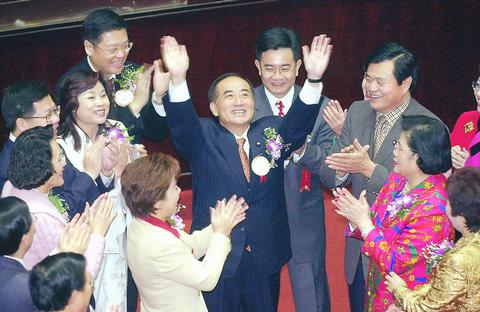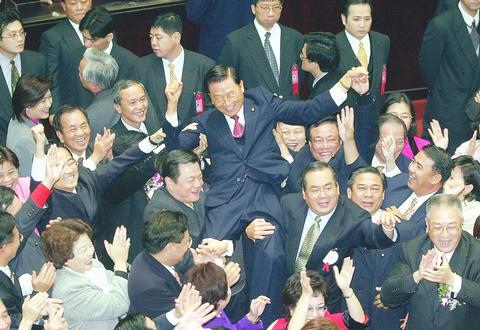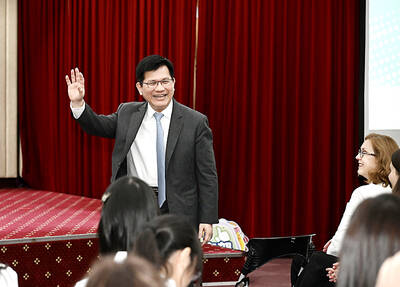While legislative Speaker Wang Jin-pyng (
The loss of the vice-speakership was greeted with anger by the DPP.
Wang received a total of 218 votes -- a resounding 97 percent of the ballot -- making him the most popular legislative speaker in history to win re-election.

PHOTO: CHIANG YING-YING, TAIPEI TIMES
Hong, who received 108 votes in the first round, eventually lost to the KMT's Chiang Ping-kun (
A second round was held because neither candidate managed to secure enough votes to win outright.
With 225 seats in the legislature, a candidate needs to garner more than half of the total number, or 113 votes, to win.

PHOTO: CHIANG YING-YING, TAIPEI TIMES
After offering his congratulations to the new speaker and vice speaker, Hong said that he hoped the new partnership would work with opposition parties to increase legislative efficiency and improve the image of the lawmaking body.
"The end of these elections marks the beginning of a brand new political climate," Hong said.
Wang declared himself victorious by the time his vote tally reached 113.
Of the seven votes Wang failed to secure, one each went to the DPP's Lu Po-chi (
When asked yesterday afternoon before the vice speaker's election whether he would endorse Hong, Wang said only that that he would "respect the choice of the people."
Before the election for speakership began at 10:30am, the DPP legislative caucus held a meeting to publicly endorse Wang in the hope that he would reciprocate the goodwill and endorse Hong's bid in the vice speakership race.
"The DPP showed a tremendous amount of goodwill by unanimously supporting Wang. By the same token, we hope to see this goodwill reciprocated," Hong said.
Hong said that the decision was made for the sake of legislative stability.
"We'd like to see Wang not just re-elected, but by an overwhelming majority. In addition, we'd like to see him remain politically neutral should he be re-elected," he said.
Asked whether the DPP caucus had reached any agreement with the KMT on the matter, Hong said that the KMT should "get the message" although they had not signed any official agreement with them.
DPP legislative whip Tsai Huang-liang (蔡煌琅) said that he was confident and optimistic that Hong would win the vice speakership yesterday afternoon.
"I'm sure there are many KMT members who agree with us that only DPP-KMT cooperation can improve the relationship between the executive and legislative branches," Tsai said.
In contrast to the DPP's act of goodwill, the KMT held a caucus meeting at midday to warn party members that they risked losing their party membership should they vote for non-KMT candidates.
"The caucus has unanimously approved supporting Chiang's bid for the vice-speakership. Those who fail to act in accordance face the consequence of having their membership revoked," said party spokesman Wu Ching-ji (
Although voting went smoothly in the morning, verbal and physical clashes erupted during the afternoon session.
Freshman legislator Chang (邱彰) quarrelled with her colleague Chiu Yi-ying (邱議瑩) and others when Chiu Yi-ying was trying to take a peek at her ballot.
The DPP's Chou Po-lun (
The DPP's Chu Hsin-yu (朱星羽) even climbed up onto the podium in a bid to sneak a peek at independent lawmaker Tsai Hau's (蔡豪) ballot while Tsai was trying to vote.
Freshman legislator Yen Ching-piao (
See Stories:
Contest reveals coalition battle
Editorial: A return to the bad old days

FIREPOWER: On top of the torpedoes, the military would procure Kestrel II anti-tank weapons systems to replace aging license-produced M72 LAW launchers Taiwan is to receive US-made Mark 48 torpedoes and training simulators over the next three years, following delays that hampered the navy’s operational readiness, the Ministry of National Defense’s latest budget proposal showed. The navy next year would acquire four training simulator systems for the torpedoes and take receipt of 14 torpedoes in 2027 and 10 torpedoes in 2028, the ministry said in its budget for the next fiscal year. The torpedoes would almost certainly be utilized in the navy’s two upgraded Chien Lung-class submarines and the indigenously developed Hai Kun, should the attack sub successfully reach operational status. US President Donald Trump

Taiwan Semiconductor Manufacturing Co (TSMC, 台積電) is expected to start construction of its 1.4-nanometer chip manufacturing facilities at the Central Taiwan Science Park (CTSP, 中部科學園區) as early as October, the Chinese-language Liberty Times (the Taipei Times’ sister newspaper) reported yesterday, citing the park administration. TSMC acquired land for the second phase of the park’s expansion in Taichung in June. Large cement, construction and facility engineering companies in central Taiwan have reportedly been receiving bids for TSMC-related projects, the report said. Supply-chain firms estimated that the business opportunities for engineering, equipment and materials supply, and back-end packaging and testing could reach as high as

ALL QUIET: The Philippine foreign secretary told senators she would not respond to questions about whether Lin Chia-lung was in the country The Ministry of Foreign Affairs on Wednesday confirmed that a business delegation is visiting the Philippines, but declined to say whether Minister of Foreign Affairs Lin Chia-lung (林佳龍) is part of the group, as Philippine lawmakers raised questions over Lin’s reported visit. The group is being led by Deputy Minister of Agriculture Huang Chao-chin (黃昭欽), Chinese International Economic Cooperation Association (CIECA) chairman Joseph Lyu (呂桔誠) and US-Taiwan Business Council (USTBC) vice president Lotta Danielsson, the ministry said in a statement. However, sources speaking on condition of anonymity said that Lin is leading the delegation of 70 people. Filinvest New Clark City Innovation Park

TPP RALLY: The clashes occurred near the Chiang Kai-shek Memorial Hall on Saturday at a rally to mark the anniversary of a raid on former TPP chairman Ko Wen-je People who clashed with police at a Taiwan People’s Party (TPP) rally in Taipei on Saturday would be referred to prosecutors for investigation, said the Ministry of the Interior, which oversees the National Police Agency. Taipei police had collected evidence of obstruction of public officials and coercion by “disorderly” demonstrators, as well as contraventions of the Assembly and Parade Act (集會遊行法), the ministry said in a statement on Sunday. It added that amid the “severe pushing and jostling” by some demonstrators, eight police officers were injured, including one who was sent to hospital after losing consciousness, allegedly due to heat stroke. The Taipei